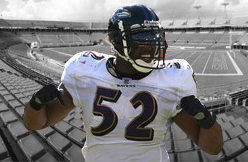New Town football player James Williamson felt like Ray Lewis was speaking directly to him, like they were the only ones in the room.
The Ravens linebacker was actually delivering an anti- steroids message Thursday to 700 high school athletes at a hotel conference center, his voice thundering and his shifting weight causing the podium to sway.
But Lewis' message — "Don't ever put anything in the body that changes who you are" — resonated deeply to Williamson, a 5-foot-11, 160-pound junior receiver and cornerback who, like many high school football players, sometimes fears he is too small to continue to excel in the sport. "I just feel like I'm undersized," he said.
Williamson is exactly the sort of athlete that Lewis and Ravens teammate Domonique Foxworth hoped to reach at an anti-steroids conference that has previously served as a public confessional for Orioles infielder Brian Roberts and New York Yankee Alex Rodriguez to talk about using performance-enhancing drugs.
"I don't think everyone wants to be bigger, but they want to be the best one way or another," Lewis, dressed in dark slacks and a button-down shirt, said in an interview after his talk. "And they're going to try to find any way to do it. So if you don't educate them on it, then they might find steroids."
Lewis and Foxworth, who attended Western Tech and the University of Maryland, indicated they have stayed away from steroids.
Williamson, too, said: "I just lift weights and eat healthy. On the weekend I'm always working out."
If he feels pressured, he said "it's not pressure from coaches, it's pressure from myself that I want to be bigger." He said Lewis "opened up my eyes. If you want to be great, you've really got to work hard."
Even with all the public steroids warnings of recent years, experts at the conference — sponsored by St. Joseph Medical Center's "Powered by ME" awareness program — said pressures on young athletes to bulk up have not subsided. Some fear youths are turning to supplements with potentially dangerous side effects.
"The number of kids who are using steroids, I believe, has decreased because of the awareness," said Powered by ME director Michael Gimbel. "However, we haven't gotten to the root issue, which is kids still want to get bigger and stronger and faster. So now instead of taking hard-core anabolic steroids, they're going in and spending thousands of dollars on supplements that are legal because they're not regulated by the government. We don't know what's in them."
Others say steroid use among youths is still prevalent. "In the last five years, I've discussed ‘juicing' with more teens and 20-something adults than ever before, and the collective opinion I get is that use of anabolic steroids is very common among males ages 16-25," said Matt Chaney, author of a book ("Spiral of Denial") about steroids. He did not attend the conference.
Among those addressing the students was Frank Marrero, the father of a California teenager who committed suicide after using steroids in 2004. Efrain Marrero shot himself after quitting steroids and suffering what his father said were serious psychological after-effects. Marrero testified about his son at the 2005 congressional hearing in which former St. Louis Cardinals slugger Mark McGwire repeatedly refused to discuss steroids. In January, McGwire admitted using the drugs.
Foxworth said coaches must be part of the first line of defense to prevent tragedies such as that of the Marrero family.
"You should be completely prepared and educated if you're going to lead kids in anything, especially in your field. I mean, the idea of a coach not knowing the ins and outs of steroids is like having an English teacher who doesn't know where to put a comma," Foxworth said.
Most states, including Maryland, don't test for steroids in high schools.
Doug DuVall, who coached the Wilde Lake football team for 36 years, said in a telephone interview that he was habitually on guard against steroids use but that it "was more widespread in the eighties and early nineties."
"It's like the concussion issue now — people are more aware of it. We were more concerned when they left us and went to the next level," DuVall said.
Trey Daniel, a junior football player at Woodlawn, said he has not encountered pressure to use performance-enhancing drugs. "Not yet," he said. "But I'm pretty sure when I go to college there would be that type of pressure."
Click here to order Ray Lewis' proCane Rookie Card.

(baltimoresun.com)



